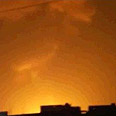
'Americans giving Assad a direction to point accusing finger at.' Strike in Syria (archives)
צילום: רויטרס
Americans selling our secrets
Op-ed: US administration intentionally pointing finger at Israel in bid to sabotage our security policy
What the hell are the Americans thinking when they point at Israel as responsible for the strikes in Syria? Past experience shows that we have shared our operational activity with them so as not to embarrass and surprise, but Washington is selling our secrets cheaply.
The first time it happened, people here thought it was a mistake. The defense minister looked into it, the American secretary of defense offered an explanation, and an investigation was even launched there. The second time the Americans sold us, the secretary of defense apologized and blamed some scapegoat in the Pentagon.
And what now? Now it is dangerous villainy coming out of the administration intentionally, in a bid to sabotage the Israeli security policy. If the Americans hadn't marked the Israel Air Force as responsible for some of the strikes which have taken place since January in Syria, Assad would have had no direction to point the accusing finger at.
The Syrian president has many reasons to be furious after the latest attack. Assad believed he had bought himself an insurance policy when he agreed to disarm Syria's chemical weapons. The Damascus regime was convinced that as long as it cooperates with the foreign inspectors destroying the chemical facilities on its land, no one will touch it.
But while the entire world is impressed by the positive Syrian approach, the transfer of weapons to Hezbollah in Lebanon continues. Indeed, the Syrians are a bit more careful than in the past – and for a certain period of time even stopped trying to transfer the problematic weapon systems as far as Israel is concerned – but the applause Assad received from the world has slightly turned his head around. Not to mention the fact that his debt to the Hezbollah organization is only growing.
The heads of the Israeli defense establishment have warned the Syrians: The Russians won't help you, the inspectors' presence won't help you, and dreams about a reconciliation conference in Geneva won't help you. If Israel reaches the conclusion – based on solid intelligence – that it is being threatened due to the spillover of problematic weapons to Lebanon or due to any other Syrian move – Assad will not be immune.
The description of the strike which took place last week in Latakia is very reminiscent of the strikes which took place on Syrian soil this year and are attributed to Israel: No jets are seen or heard. Someone describes a series of particularly strong explosions, eyewitnesses talk about a missile they saw or didn't see coming from the sea, a military facility sustains damage – and that's it. There are no incriminating signs. Even the foreign navies stationed in the area, which are monitoring every movement in the sea, air and land, are not reporting any unusual movements.
Assad's sensitive area
Someone has, apparently, the ability to carry out an accurate attack, with missile guidance, from ranges beyond the detection systems. That someone also has, apparently, the ability to commit a tactical deceit which creates the surprise.
Whoever carried out the attack the other day struck a military target in the heart of Alawistan – the Alawite canton which is being shaped into an autonomy in crumbling Syria. It will be the last stronghold of the current Syrian regime. That's where it will drain into and concentrate all the strategic means at its disposal to prepare for a rainy day when the Alawite faction's existence will have to be protected.
If Assad wants to hide chemical weapons, he will hide them there. If he wants to keep the sophisticated anti-ship missiles (Yakhont) and the new surface-to-air missiles he received in the past year from the Russians, he will move them there. Whoever struck made it clear to the president in Damascus: Don't pretend to be wise. I will attack you even in your most sensitive area.
The Syrian bought himself an insurance policy, but he also bought himself handcuffs. In light of the world's desire to keep him on his seat, at least until the summer of 2014, for good behavior – his hands are tied in terms of a military response against the attacker.
And as for the inspectors' success in dismantling the production and mixing facilities of chemical weapons on Syrian soil, it's worthwhile listening carefully to what the head of the inspection delegation said. When he was asked if he was convinced that all sites were destroyed, he responded: We destroyed the sites the Syrians uncovered to us.
Which means, between the lines: It's possible that the Syrians did not uncover all the sites to us. In the meantime we are not getting into a conflict with them. Whatever they reveal – we buy into. What they hid and we know about – we'll take care of in the end.










